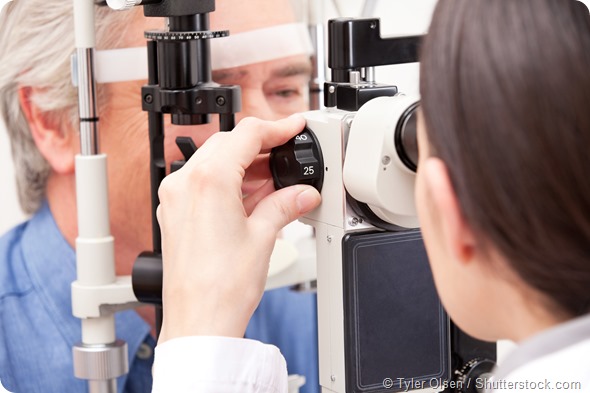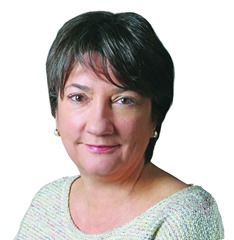Age-related macular degeneration is a condition of the macula, a tiny area of the retina at the back of the eye. Your macula is only about the size of the grain of rice, that’s about four millimeters across. It is responsible for nearly all our good, clear vision, so all the vision that we have in focus straight ahead of us. The fine detail of what we see and a lot of our color vision is all the responsibility of the macula.
That means people with advance macular degeneration cannot drive, they can't read, and they have difficulty seeing faces, even recognizing their nearest and dearest, becomes very difficult.
It can be a very isolating, very depressing disease. People who have macular degeneration are much more likely to suffer from falls. They are three times more likely to be depressed and it is associated with increase suicidal thoughts.
Although you don't go completely blind with macular disease, it is nevertheless a very debilitating, and can be devastating, condition.
Who does AMD affect?
As its name suggest, age-related macular degeneration is a condition of aging. The older you are, the more likely you are to get it.
Of course one of the reasons why AMD is becoming such an important health and social issue is that very many people in our aging societies are living into their 70s, 80s and 90s. That means that the number of people with AMD is rising very considerably.
Age is the most important risk factor. It's also becoming clear that our genes also influence whether or not we get AMD. There are at least 15 genes that have now been identified as raising people’s risk of developing AMD. Our age and our genes are two things that we can't yet do anything about.
There are some environmental risk factors as well. The most important of which is smoking. Many people do not realize that smoking causes blindness. The message is often missing from anti-smoking messages, which simply concentrate on the life-threatening side effects of smoking. Sight loss, however, is a very important effect of smoking. Smoking causes macular degeneration.

If you smoke, you're 3 to 4 times more likely to develop macular disease. If you smoke and you have certain genetic characteristics, then your risk goes up enormously. You could be 20 or more times more likely to get macular disease if you have those certain genes and you smoke. Smoking is incredibly bad for your eyes.
There's also some evidence that people who have a poor diet, low in antioxidants may be more be at risk with macular degeneration.
It turns out actually that a lot of risk factors for AMD are quite similar to some of the risk factors with things like heart disease and stroke, for example: high blood pressure, obesity, poor diet, smoking, lack of exercise, all those things that are bad for your general health are also very bad for your eyes.
How does AMD impact a person’s life?
Well, there are two types known usually as dry and wet. Dry macular degeneration is a condition that comes on very slowly. It may be very many months or maybe even years before people lose their central vision. There's no treatment at all for a dry AMD.
Over time, people will lose their central vision. They will just have gaps in their vision. They will be unable to drive. They won't be able to read. They don't recognize faces. Watching the television is very difficult. Getting out and about is difficult. People obviously, lose their confidence when they can't see.
One of the most awful things that people so often talk about is that they can't see their friends walking towards them in the streets. Many people are afraid of offending people because they walk pass them without recognizing who they are. It can affect relationships actually because people don't always realize the impact of AMD because most people look completely normal.

People often describe losing their sight as being like a bereavement. They go through a great deal of the same sort of grieving process that people recognize in bereavement. Things like disbelief to begin with. Anger might be there for a while. Then gradually people move towards acceptance, one hopes. Clearly, a lot of people need counseling and support to help them to move through those various grieving stages when they mourn their sight
The other form of macular degeneration is called wet. It is called wet because it's characterized by the growth of abnormal leaky blood vessels at the back of the eye. The leakage scars the macula and can cause a very sudden and dramatic loss of central vision. Wet AMD is much more aggressive, and fast-acting than dry AMD. Somebody untreated, they could lose their sight within 2 or 3 months.
There are several drugs which are now used to try to slow the progress of wet AMD. There's never been anything like this before, for AMD. Even so, they only slow down the progress. It's not a cure.
The drugs have to be injected into the eye, so that the drug can reach the back of the eye, so it's a very difficult treatment to have. It's a great burden on the individual who has to go regularly to hospital to have injections into their eye.
These treatments have proven to be very costly for health systems around the world.
How does the Macular Society help people affected by central vision loss?
We were set up about, nearly 30 years ago now, by a woman called Elizabeth Thomas who was diagnosed with macular degeneration and was dismissed from the eye clinic with the words, "Nothing can be done," ringing in her ears.
“You won't go completely blind with macular disease. There's no treatment you don't need to make another appointment.” She left the eye clinic with absolutely no further support. She thought that this was really inadequate and that people given this diagnosis did need some support. With the help of two very empathic ophthalmologists she set up the Society.
We offer support and information to people with macular degeneration, and we fund medical research to help find a cure.
In the UK, we have more than 300 peer support groups. These are very important ways of helping people cope and learn to live with macular degeneration. We know that with the right kind of help and support, people with macular disease can get on with their lives very well. Without support of course, it's a different story.
With the right kind of help and support, people can learn to do some of the things that they have always enjoyed doing. They may have to do them in a different way, but often they find they can do things that they thought, perhaps, that they wouldn't be able to do.
As well as peer support we offer counseling and befriending, because some people do get trapped in their homes, and they can't get out and about.
We also coach people in a technique known as Eccentric Viewing, which involves helping people learn to use their remaining vision more effectively. This enables them to do some survival reading. By this we mean they may be able to read the gas bill, or the bank statement or something. This gives people a little bit more autonomy, because obviously one of the difficulties if you can't read, is how do you manage your own finances, and so forth?
As I mentioned earlier, there are so many more people getting AMD now because of the aging population that is becoming a very significant issue. We campaign for better care, and resourcing of macular degeneration, and for funding of research.
Macular research is very badly under-funded. We urgently need to get more money into research. There are some very exciting things happening in macular degeneration research, but they're not happening quickly enough.
As our aging society develops we're at risk of having a condition that will overwhelm the resources that we have available. It is urgent now that we put money into research, and to find better treatment and cures for macular degeneration.
Cathy, you were recently appointed CEO of the Macular Society. What is your vision for the charity?
We want to make sure that absolutely everybody who is diagnosed with a macular condition knows about the society, and the support and help that's available from us.
We also want to raise the profile of macular disease so that we actually have a coherent platform on which to base increased funding of medical research. We must find a way of increasing the amount of funding going into medical research.
What do you think needs to be done to improve eye health?
We know from lots and lots of studies that people value their eyesight. Of all the senses, eyesight is the most important. One study found that many people would rather lose a limb then lose their eyesight.
It is a paradox that people take so little care of their eyesight and know so little about how to care for their eyes. Certainly in the UK many people do not go for regular eye health tests, for example, at their local optician's. Many people think you only need to have your eyes tested if you can't see. Of course, they don't realize that an optometrist can look at the back of your eye, can look inside your eye and see the early signs of all sorts of eye conditions, which are potentially sight-threatening such as glaucoma, or wet AMD. Having regular eye health tests is an important part of looking after your eyes.

People also don't know that smoking causes sight loss. We are very badly informed about the things that are damaging to our eyes. They don't know that a poor diet can affect your sight. We don't protect our eyes enough from ultraviolet light. We know that ultraviolet light damages our skin and we put sunscreen on. We don't think about the potential risk to our sight of over-exposure of ultraviolet light. As a precaution, good, quality sunglasses are quite an important protection for your eyes.
One of the first things that would improve eye health would be to raise awareness of the importance of taking care of your eyes. We take eyes for granted, even though we value them so much.
The second thing is that sight loss, for some reason, doesn't have a high priority in general. Again, this is a paradox, because we know how much sight means to people. If you look at, for example, the funding of eye disease in the UK it is incredibly poor compared to many of the other health conditions.
It was calculated recently, that spending on eye research in the whole of the UK in 2014, amounted to around £22.7m - that's all public funding, from government and from charities. This is a fraction of the amount that's spent on cancer, for example, which was nearly £500m.
Sight just does not have a high enough priority. This has to change.
In your opinion, what changes to the NHS are required?
The main change, I think, to the NHS would be to encourage the commissioning of eye care services from start to finish. At the moment, there are lots of disjointed services where people can fall through the middle.
We know that sight loss rehabilitation services are very patchy in the UK, because they're seen as a bolt on at the end, when all else has failed. Very often the bolt is not bolted on very securely, and people fall through a lot of gaps.
There's a resource issue in the NHS for eye health. There's a resource issue across the world for this condition now. We know that in the UK, NHS eye clinics are absolutely full to bursting, because of the numbers of people who are developing wet AMD. This area is underfunded.
How does the Macular Society plan to help bring about change for people affected by MD?
This is about voice. I think it's not just about our own voice. It's about the voice of our members, and supporters, and people with macular degeneration and the voice of other organizations in the sight loss sector.
We must raise awareness of macular degeneration, because the numbers are very significant.
In the UK, at the moment, there are six hundred thousand people with late stage AMD. In other words, they have sight loss as a result of AMD. Six hundred thousand people. That will be six hundred and eighty thousand people, just by the end of this decade, so in four years.
There will be a hundred and ninety-six million people with AMD around the world by 2020. The numbers are quite extraordinary. It's imperative that we get people to understand the urgency of addressing the AMD problem.
What do you think the future holds for people living with macular conditions?
That will depend on the speed of research and that needs money to bring it to fruition. The Macular Society funded the early stages of a stem cell project, known as the London Project to Cure Blindness back in 2008.
In September 2015 the first patient entered the first stage of a trial. They injected a tiny patch of stem cells into the eye of a woman in her 60's, who has wet age-related macular degeneration. We'll know either the end of this year or early in 2016, whether treatment of that first patient has been a success. If it is, then of course there will be more patients and bigger trials.
Another stem cell trial using a different technique is a little bit further forward. In the tiny number of patients they've been treating so far there have been some promising signs. Stem cell therapy is an interesting way that might go forward.
We know that there are some drugs in development for dry AMD. They don't look as if they're going to be the complete solution but they may help a little bit. We know that there's some very interesting work going on in gene therapy, looking at how we can influence the genetic components of macular degeneration.
But we know that AMD is a very complex disease; it's not just about genes, there are also environmental factors as well. It's going to be a difficult area to crack. If we can put some more research effort into AMD there are some very interesting and exciting avenues to explore but we need investment in order to do that.
If we can do that then the outlook for AMD is promising. I speak to scientists who say that there are good reasons to think that we will be able to solve this problem.
So the outlook for people with AMD is uncertain. It could be very promising. If we can get the research funding in then we may well be able to find some really good solutions. On the other hand, if people continue to neglect this area then the outlook for people with AMD is uncertain.
Where can readers find more information?
They can find more information on our website: http://www.macularsociety.org/
We also have a helpline: 0300 3030111
About Cathy Yelf
Cathy Yelf joined the Macular Society in 2008 as Head of External Relations responsible for leading the Society’s policy, press and campaigns work. She was appointed as Chief Executive in February 2015.
The Society is the specialist UK charity for people affected by macular conditions. It is the largest patient member group in the UK sight loss sector with 20,000 patient and eye care professional members.
As well as being the voice of people with macular disease the Society provides a wide range of patient support services. It also funds medical and social research and campaigns for better care.
The Macular Society is a member of the Association of Medical Research Charities and of Vision 2020UK. Cathy sits on numerous clinical trial steering committees as well as the UK Clinical Council for Eye Care Commissioning and other national bodies promoting better eye health.
Before working in the eye care sector Cathy had a long career in journalism firstly in newspapers and then broadcasting. She worked for the BBC for 25 years in news and current affairs, politics and documentary making and as a trainer in broadcasting and editorial standards.